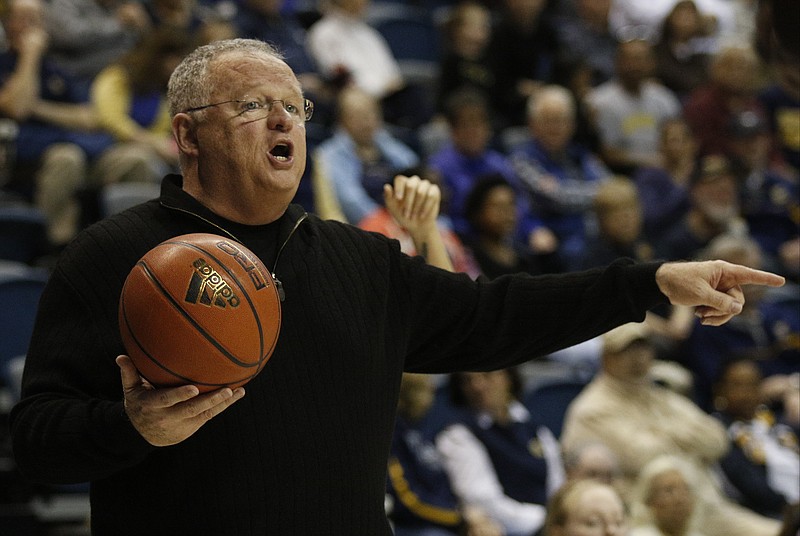Everyone knows that University of Tennessee at Chattanooga women's basketball coach Jim Foster keeps some pretty good company when it comes to college hoops coaches. Connecticut's Geno Auriemma, Notre Dame's Muffet McGraw and former Vanderbilt and South Carolina men's coach Eddie Fogler are among his closest friends.
But Saturday afternoon at McKenzie Arena found former Notre Dame, LSU and Indiana football coach Gerry DiNardo and his wife Terri in the stands cheering the Mocs during their 83-52 victory over Western Carolina.
"What I appreciate about Jim the most as a coach is how he keeps things in perspective," DiNardo said after watching Chelsey Shumpert score 15 points in boosting UTC to 15-3 overall and 3-0 in Southern Conference play.
"What I like best about him as a friend is his loyalty. He's always been there and it's hard to keep friends in this business, as spread about the country as you can get."
Since he left coaching for the broadcast boost at ESPN, then his current gig with the Big Ten Network, DiNardo and his wife Terri have spread their time between Chicago and Destin, Fla. He'll be in Mobile, Ala., this week for the Senior Bowl.
But with DiNardo having just witnessed the first Division I college football playoff ever, a sports writer couldn't help but wonder his thoughts going forward. Are four teams enough? Is the season growing too long? Are we really about to see the Fat-Cat Five conferences break away to form their own organization?
"The playoff was a huge success," DiNardo said. "No one could dispute that. But I'm on my hands and knees at night praying that it's not going to get any bigger. I cringe when I think about an eight-team playoff."
DiNardo's concerns don't center nearly as much on logistics, bowl issues or media over-saturation as the players' health and safety -- an all-too-novel concept.
"With offenses the way they are now, I would guess that Ohio State and Oregon played more snaps this year than most NFL teams, while playing one less game," he said. "You're getting close to 100 snaps a game for some of these offenses, and a typical NFL game has 60-65.
"We talk about protecting the players, about focusing more on helmet-to-helmet contact and protecting helpless players, but we're also already talking about playoff expansion, more games. It's contradictory. It's why some people say college athletics talks out of both sides of its mouth. With all the hits we're seeing in space -- and the hits are more vicious in space -- the players are more at risk than they've ever been in the history of the game."
That's not all that bothers DiNardo, who helped Notre Dame win a national championship as a player in 1973.
The academics, or lack there of, understandably concern a man with a Notre Dame diploma who coached at Vanderbilt.
"Regardless of the cost, we need to do better by the kids who aren't ordinary admissions," DiNardo said. "We're better than we used to be. But we have an obligation to those athletes who wouldn't have been admitted unless they were athletes to do everything possible to get them a degree."
Asked if again making freshmen ineligible would help, DiNardo nodded yes, but quickly countered, "It's not a practical solution now. With scholarship limits, you couldn't do with that few players. And the high school kids and parents have gotten so crazy (about playing immediately). What might work is limiting some players because of academics, but upping scholarships to 90 or so. I could see the autonomous group (the power five conferences) looking to get that done as long as it works within Title IX."
Then there's which school won the national championship and which conference was left out of the title game. DiNardo may have coached at two SEC schools, but national champ Ohio State's Big Ten now pays his salary.
"I thought it was good for college football that the SEC dominated the way it did," he said. "It challenged all the other conferences to be better than they were. But I also think it's good to see other leagues win this thing. It shows their hard work is paying off."
But wouldn't more good teams make a larger playoff a better solution?
"OK, TCU got left out," DiNardo said. "Someone is always going to be left out."
That doesn't mean he thinks TCU won't be in the mix next year. Nor is he sure Ohio State will repeat.
"TCU definitely has a chance to get there," he said. "And I'm not predicting an Ohio State repeat just yet. They'll have to get by Michigan State in their division, and Michigan State is really good."
But all that won't be sorted out for months to come. On Saturday evening, the Mocs' work done, the DiNardos headed out of McKenzie with the Fosters for an evening that almost was certain to include at least one excellent bottle of wine.
Which might be one reason why when DiNardo was asked about his long friendship with the UTC coach, he smiled and said, "The wine's part of it."
Contact Mark Wiedmer at mwiedmer@timesfreepress.com.
